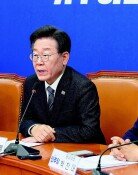Paralyzing nat`l security knowledge
Paralyzing nat`l security knowledge
Posted December. 07, 2010 11:32,
A survey has found that 43 percent of public school students in Seoul did not know that North Korea attacked Yeonpyeong Island or believed it was started by a South Korean military drill. Thirty-six percent were unaware that the sinking of the South Korean naval vessel Cheonan was perpetrated by the North. On the Korean War, 26 percent did not know that the North invaded the South. These are what a survey found about 1,240 students at seven schools in Seoul Nov. 29-30, a week after the shelling of Yeonpyeong, conducted by the (South) Korean Federation of Teachers Associations.
One middle school student said on the Cheonan sinking, Our teachers said the North didn`t do this and that such a thing always happens before elections. The influence of a teacher on public school students is enormous, and the survey results show that national security education is absent at schools and ideological education favoring the North and opposing the U.S. has been left unattended. At the center of the debate is the (South) Korean Teachers and Education Workers Union. Legalized in 1999, the union has distorted students sense of national security through ideology classes. The number of high school students educated by the union is an estimated 4.7 million.
South Korea got a shock five years ago when one of the unions teachers attended a memorial service for North Korean partisans with 180 middle school students. The partisans, whom certain unionized teachers called patriots committed to unification, are a communist group who fought to overhaul the Republic of Korea during the Korean War. A student wrote, The National Security Law discourages unification on a note after meeting unconverted long-term prisoners and hearing the claim on repealing the law and pulling out U.S. forces from South Korea. A unionized teacher taught his students that Pyongyang does not want war and that nuclear weapons are its tool to signing a peace agreement with Washington.
A court acquitted a unionized teacher on the charge of violating the National Security Law in both the first and second trials, citing no substantial harm to undermine the legitimacy of a free democracy. Thirty to forty percent of public school students do not know about Pyongyangs provocation and 16 percent said on the shelling of Yeonpyeong, We caused the shelling because our military conducted an unnecessary exercise, or (South) Korea attacked first. Will judges see the potential for substantial harm when such students are armed with weapons like the North Korean partisans?
Seoul Metropolitan Office of Education Superintendent Kwak No-hyun has cut the budget for reunification and national security education to fund his free lunch plan next year. If domestic education cares nothing for national security, South Korea will be put in a more vulnerable situation.







